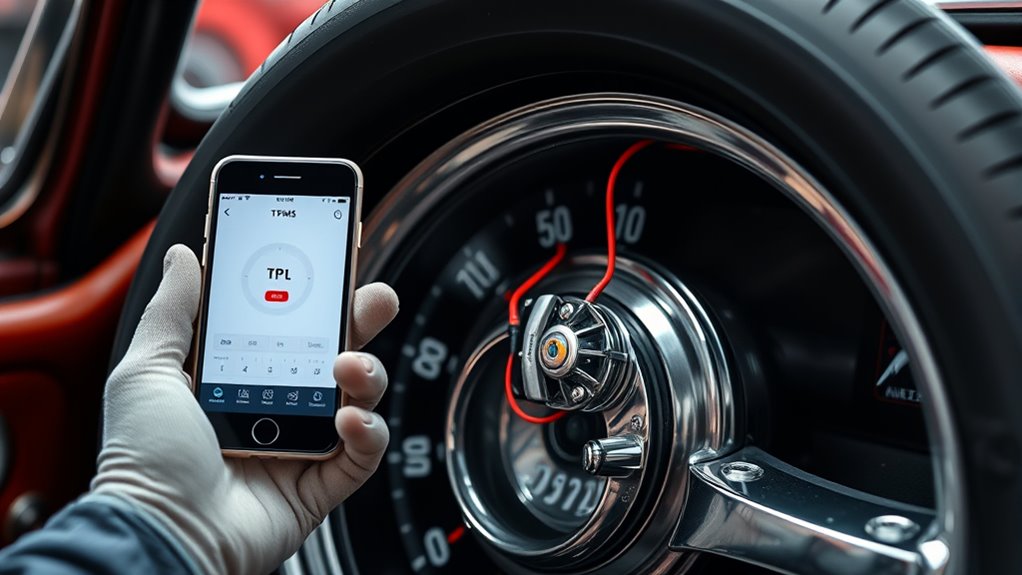If you’re looking for reliable TPMS retrofit kits for older vehicles, I recommend options like Schrader’s OE-quality kits with wireless displays, universal metal valve service tools, and vehicle-specific sensors from Denso or Standard Motor Products. These kits improve safety by providing real-time pressure and temperature alerts and easily fit a wide range of cars and trucks. Keep in mind compatibility and installation ease—if you’d like to see which kit fits your needs best, there’s more to explore.
Key Takeaways
- Look for OE-quality TPMS retrofit kits with real-time pressure and temperature monitoring for enhanced safety in older vehicles.
- Prioritize kits with universal sensors, easy installation, and compatibility with various makes and models.
- Consider solar-powered or long-lasting battery sensors that require minimal maintenance and ensure consistent performance.
- Check for vehicle-specific sensors and reprogramming tools to ensure proper fit and reliable tire pressure alerts.
- Evaluate system accuracy, warranty coverage, and customer reviews to select durable, cost-effective TPMS solutions.
SCHRADER TPMS Retrofit Kit for Passenger Cars and Light Truck

If you own an older passenger car or light truck without factory-installed TPMS, the Schrader TPMS Retrofit Kit is an excellent choice to add OE-quality monitoring quickly and easily. This solar-powered, wireless display provides real-time pressure and temperature readings by location, with both audio and visual alerts for safety. It’s simple to install, supporting clamp-in and snap-in stems, and compatible with various vehicles. Schrader has been a trusted leader in TPMS technology since 1997, and this kit reflects their commitment to quality and innovation. With user-friendly features and strong customer ratings, it’s a reliable upgrade to keep your vehicle safe and properly maintained.
Best For: vehicle owners of older passenger cars or light trucks seeking an OE-quality, easy-to-install TPMS upgrade for enhanced safety and maintenance.
Pros:
- Easy to install with clamp-in and snap-in stem options, compatible with various vehicles
- Solar-powered, wireless display provides real-time pressure and temperature monitoring by location
- Trusted brand with strong customer ratings and a history of innovation in TPMS technology
Cons:
- Requires initial programming and setup, which may be challenging for some users
- Limited to vehicles compatible with the retrofit kit, not universal for all models
- The kit’s weight and size may be less convenient for portable or space-constrained installations
Alligator U1 Universal Metal TPMS Service Kit Box of 20

The Alligator U1 Universal Metal TPMS Service Kit is an excellent choice for professionals and auto shop owners seeking a streamlined, reliable solution for maintaining metal valve TPMS sensors. With 20 pieces per box, it’s compatible with 97% of metal valve sensors on the market, simplifying inventory and training. Its durable metal construction with a silver finish ensures longevity and ease of use. The kit enables faster service, reduces SKU complexity, and helps prevent lost sales through consistent availability. Manufactured by Wegmann Automotive, it’s a practical, cost-effective tool that enhances efficiency and supports better customer service for tire maintenance.
Best For: auto shop owners and professional technicians seeking a reliable, universal solution for maintaining metal valve TPMS sensors efficiently.
Pros:
- Compatible with 97% of metal valve TPMS sensors, ensuring broad applicability
- Durable metal construction with a sleek silver finish for longevity
- Simplifies inventory management and training, reducing SKU complexity
Cons:
- May not be suitable for sensors with plastic or other non-metal valve types
- Limited to metal valve sensors, so incompatible with certain sensor models
- Slightly higher cost compared to basic plastic valve tools
Wheel Accessories Parts TPMS Service Kits (12 Pack)
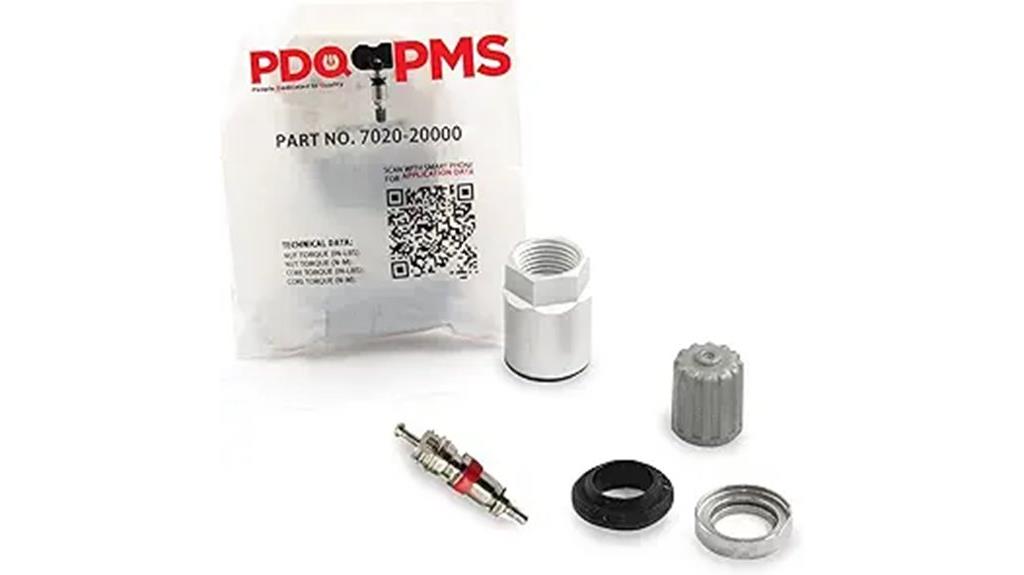
Wheel Accessories Parts TPMS Service Kits (12 Pack) stand out as an excellent choice for professional technicians and DIY enthusiasts who need reliable, OE-standard replacement components for tire pressure monitoring system sensors. This kit includes essential parts like grommets, nuts, washers, and core caps, ensuring a complete valve service. Designed to fit BMW, Chevrolet, and Honda vehicles, it matches OE part numbers and standards for durability. Manufactured in the US with high-quality materials, these components are extensively tested for performance. Ideal for tire maintenance or sensor replacement, this kit helps maintain proper TPMS function and vehicle safety, making it a smart investment.
Best For: professional automotive technicians and DIY enthusiasts seeking reliable OE-standard TPMS valve components for tire maintenance and sensor replacement.
Pros:
- Includes all necessary parts for complete valve service, ensuring a professional installation.
- Manufactured to exact OE standards with high-quality materials for durability and performance.
- Compatible with multiple vehicle brands like BMW, Chevrolet, and Honda, making it versatile.
Cons:
- Limited to vehicle-specific fitment; may not be suitable for all makes and models outside the listed brands.
- Requires proper verification via Amazon Confirmed Fit to ensure compatibility.
- May be overkill for casual users who only need a single replacement component.
Denso 999-0601 TPMS Sensor Maintenance Kit

For those seeking a reliable and easy-to-maintain TPMS sensor, the Denso 999-0601 TPMS Sensor Maintenance Kit stands out because it’s lightweight and compatible with modern digital systems. Weighing just 0.1 pounds and measuring 1 x 1 x 0.5 inches, it’s designed for seamless clamp-in mounting. It’s suitable for various vehicles with digital TPMS setups, ensuring accurate pressure readings and system reliability. The kit includes a single sensor, with no core charge, and is built from durable materials. Available since 2014 and highly rated by users, it’s a practical choice for maintaining or replacing your tire pressure sensors effortlessly.
Best For: vehicle owners and maintenance professionals seeking a reliable, easy-to-install TPMS sensor maintenance kit compatible with digital tire pressure monitoring systems.
Pros:
- Lightweight and compact, making installation and handling simple
- Compatible with modern digital TPMS systems for accurate pressure monitoring
- No core charge required, offering cost-effective replacement
Cons:
- Contains only a single sensor, which may require additional kits for multiple tires
- Designed primarily for clamp-in mounting, not suitable for all sensor types
- Limited to vehicles with digital TPMS systems, not compatible with analog or older models
Wheel Accessories Parts PDQ OEM TPMS Sensor Service Kit (12 pcs)

If you’re looking to restore or upgrade your vehicle’s TPMS system easily, the Wheel Accessories Parts PDQ OEM TPMS Sensor Service Kit offers a practical solution. This kit includes 12 rubber valve stems compatible with popular vehicle makes like GM, Ford, Subaru, Chrysler, Dodge, and Jeep, manufactured to OEM standards. Made from ozone-resistant EPDM rubber, the valve stems withstand extreme temperatures and resist oxidation. They feature self-tapping screws for secure installation and vibrational stability. With straightforward installation and proven durability, this kit ensures your TPMS functions correctly, enhancing safety and tire management. It’s a reliable choice for vehicle owners seeking an affordable, high-quality retrofit solution.
Best For: vehicle owners and technicians seeking an affordable, durable solution for restoring or upgrading TPMS sensor functionality across multiple vehicle makes.
Pros:
- Easy to install with self-tapping screws, saving time and effort.
- Made from ozone-resistant EPDM rubber, ensuring long-lasting performance under extreme temperatures.
- Compatible with a wide range of vehicle brands including GM, Ford, Subaru, Chrysler, Dodge, and Jeep.
Cons:
- Valve stems are not threaded, which may require careful handling during installation.
- Does not include the TPMS sensors themselves, only the valve stems.
- Compatibility is limited to vehicles specified; may not fit all models outside listed makes.
Standard Motor Products TPM4012SK Tire Pressure Monitoring System Sensor Service Kit
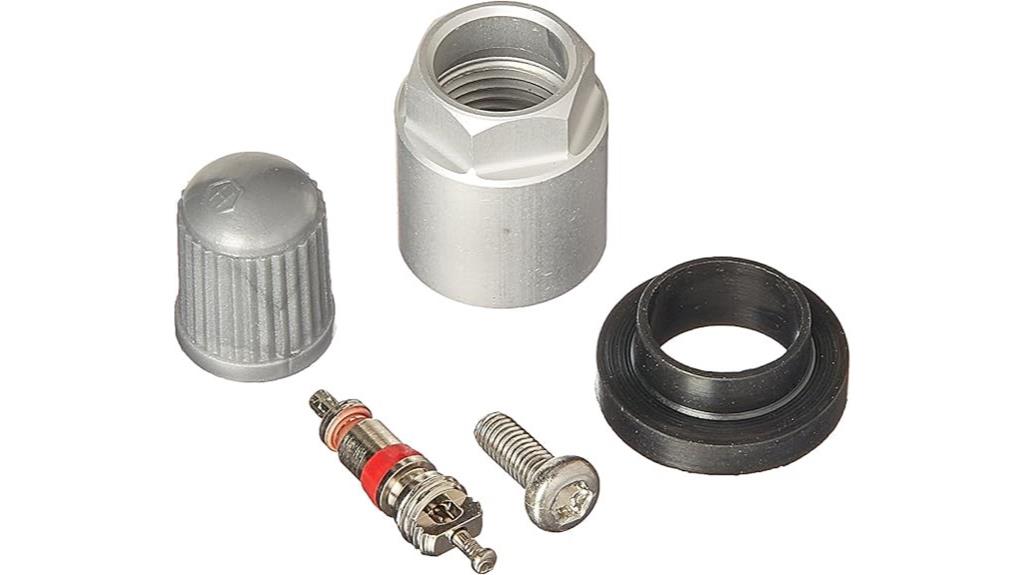
The Standard Motor Products TPM4012SK Tire Pressure Monitoring System Sensor Service Kit stands out for vehicle-specific compatibility, making it an excellent choice for owners of older vehicles seeking reliable TPMS upgrades. This kit includes a valve core tailored to fit particular makes and models, ensuring precise installation. With a painted exterior finish and compact dimensions, it’s designed for durability and ease of use. Rated 4.5 out of 5 stars from hundreds of reviews, it’s a trusted option since 2014. Its availability on Amazon with a flexible return policy makes it accessible and dependable, helping you maintain safety and proper tire pressure effortlessly.
Best For: vehicle owners seeking a reliable, vehicle-specific TPMS sensor upgrade for older models to ensure proper tire pressure monitoring.
Pros:
- Vehicle-specific fit ensures precise installation and compatibility
- Durable painted exterior finish enhances longevity
- Highly rated with 4.5 stars from hundreds of satisfied customers
Cons:
- Limited to certain makes and models due to vehicle-specific design
- Slightly higher cost compared to generic sensors
- Availability may vary based on retailer stock
VXDAS TPMS Relearn Tool for GM Vehicles
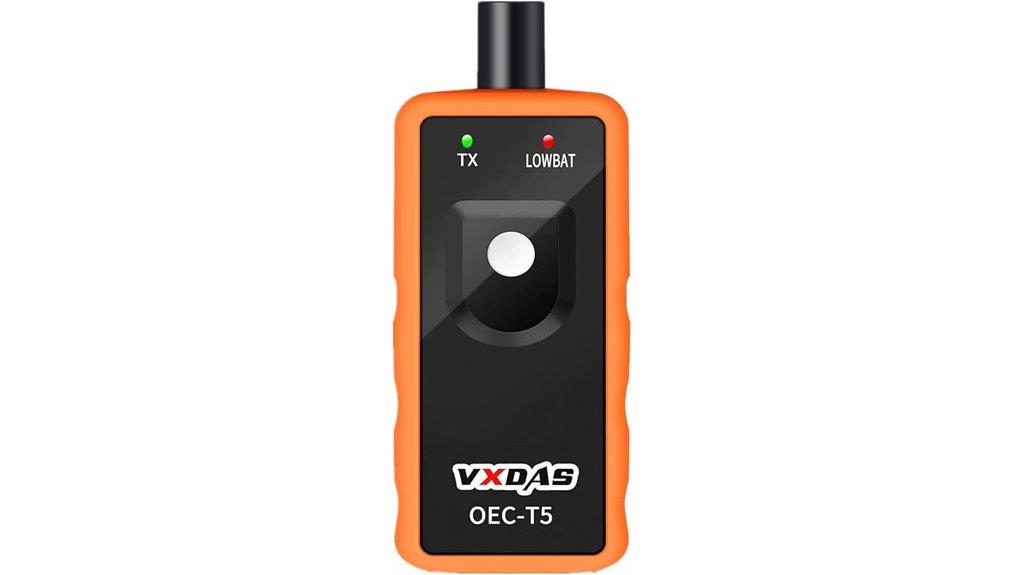
Owners of GM vehicles from 2006 to 2023 will find the VXDAS TPMS Relearn Tool an essential device, especially if they want quick and hassle-free sensor activation without visiting a dealership. This compact, easy-to-use tool activates TPMS sensors in just 1-2 minutes, saving time and money. It’s compatible with most GM models and sensors operating on 315/433 MHz frequencies. Simply put the vehicle in TPMS Learn Mode, hold the tool near the valve stem, and press the button. It’s ideal for replacing sensors, clearing alarms, or changing tires, helping maintain *ideal* tire pressure and enhancing safety on the road.
Best For: vehicle owners with GM cars from 2006 to 2023 seeking a quick, easy, and cost-effective way to activate or reset TPMS sensors without visiting a dealer.
Pros:
- Enables sensor activation within 1-2 minutes, saving time and effort
- Compatible with a wide range of GM models and 315/433 MHz sensors
- Compact, lightweight, and simple to use with clear instructions
Cons:
- Not suitable for heavy trucks with more than 4 tires or external TPMS systems
- Requires the vehicle to be in TPMS Learn Mode, which may need prior knowledge
- May have limited compatibility with non-GM or aftermarket sensors
TPMS Sensor Set for GM Chevy Silverado Buick Cadillac GMC (4 Sensors + Relearn Tool)

For anyone looking to upgrade their older GM vehicles, this TPMS sensor set provides a reliable, easy-to-install solution that restores accurate tire pressure monitoring. Compatible with GM models made after 2006, including Silverado, Buick, Cadillac, and GMC, it features four external sensors and a relearn tool for quick setup. The Gen 2 sensors offer improved transmission signals and durability, with a battery life of around two years. Installation is simple—just screw the sensors onto the valves and use the included EL-50448 tool to sync with your vehicle’s ECU in about five minutes. All parts are tested for quality, ensuring dependable performance and peace of mind.
Best For: vehicle owners with GM models manufactured after 2006 seeking an easy, reliable TPMS upgrade for trucks, SUVs, and cars like Silverado, Buick, Cadillac, and GMC.
Pros:
- Easy DIY installation with screw-on sensors and quick reprogramming using the included tool.
- Improved Gen 2 sensors offer stronger signals, enhanced durability, and a longer lifespan of around two years.
- Compatible with a wide range of GM vehicles, providing accurate tire pressure monitoring and peace of mind.
Cons:
- External sensors may be more susceptible to damage from external elements compared to OEM internal sensors.
- Batteries are replaceable but may require periodic maintenance or replacement after approximately two years.
- Some users might need additional guidance to ensure proper synchronization with their specific vehicle models.
Marcala TPMS Sensors Set of 4 for Tire Pressure Monitoring System
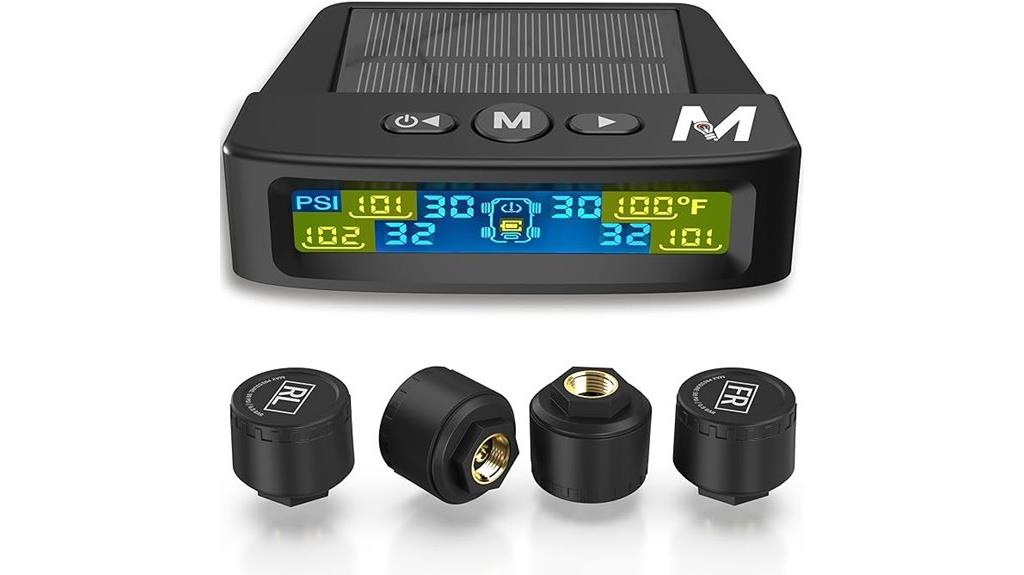
If you’re seeking a reliable TPMS retrofit kit that easily adapts to various vehicle types, the Marcala TPMS Sensors Set of 4 stands out with its simple, no-fuss installation. These external sensors fit SUVs, trucks, cars, and motorcycles, measuring tire pressure up to 98 PSI—higher than many competitors. They install in under a minute without complex setup and work on 1-4 wheels within a 20-foot range. Waterproof IP67, they perform reliably in rain or shine. The system provides real-time pressure and temperature alerts, with a bright LCD display and dual solar/USB charging, ensuring safety and convenience during every drive.
Best For: vehicle owners seeking a quick, reliable, and easy-to-install TPMS solution compatible with a variety of vehicles including SUVs, trucks, cars, and motorcycles.
Pros:
- Easy installation in under a minute without complex setup
- Waterproof IP67 rating ensures durability in all weather conditions
- Real-time pressure and temperature alerts enhance safety and vehicle maintenance
Cons:
- Limited range of 20 feet may not suit larger vehicles or certain setups
- External sensors could be more vulnerable to damage without additional protective measures
- Requires dual charging (solar/USB), which may be inconvenient in low-light conditions
Tymate TM7 Wireless Tire Pressure Monitoring System
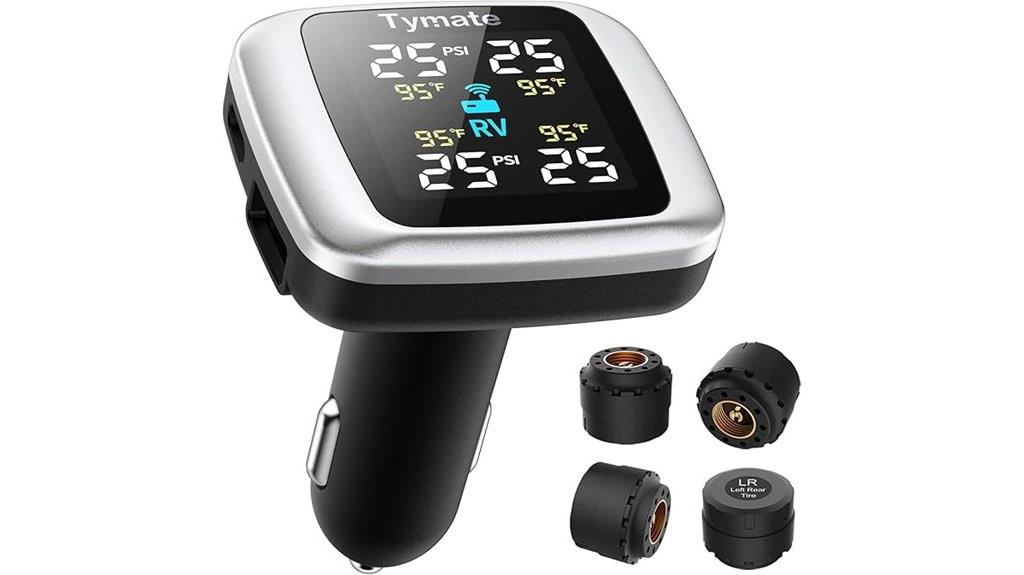
The Tymate TM7 Wireless Tire Pressure Monitoring System stands out as an ideal retrofit option for drivers seeking an easy-to-install safety upgrade for older vehicles. It offers real-time tire pressure and temperature monitoring with high accuracy, supporting various vehicle types like RVs, trucks, and sedans. The system features four external sensors and a bright LCD display for clear visibility in any light. Installation is quick—just plug into your cigarette lighter—no wiring needed. With multiple alarms for pressure, temperature, and signal issues, it keeps you informed and safe. Plus, the dual USB ports add convenience for charging devices during drives.
Best For: Drivers with older vehicles seeking an easy, reliable, and comprehensive tire safety monitoring upgrade without complex installation.
Pros:
- Simple plug-in setup with no wiring required, ideal for DIY installation.
- Accurate real-time pressure and temperature readings with clear, adjustable display.
- Multiple alarms for comprehensive safety alerts, including pressure, temperature, and signal issues.
Cons:
- Limited to vehicles with 12V cigarette lighter sockets; may not fit all vehicle types.
- External sensors require battery replacement (CR1632), which may need periodic maintenance.
- Signal range could be limited for very large trailers unless using an additional repeater.
RV Tire Pressure Monitoring System (TPMS) Kit with Sensors, LCD Display, and Alarm Modes
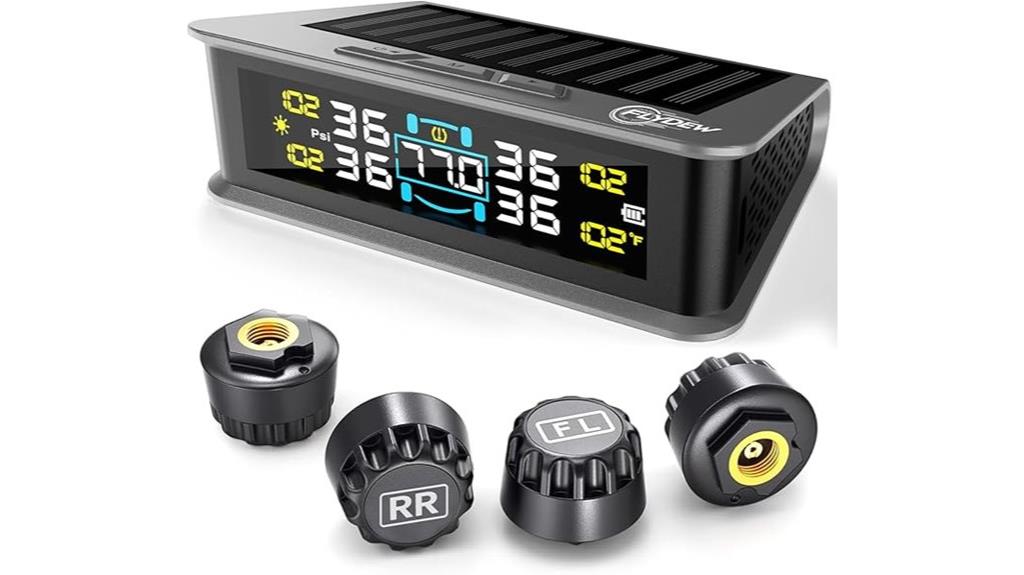
This RV Tire Pressure Monitoring System (TPMS) kit stands out with its advanced sensors that update every 0.3 seconds, providing real-time tire pressure and temperature data with exceptional accuracy. It offers six alarm modes, including high/low pressure, temperature, and sensor disconnection, with customizable thresholds to suit different loads and conditions. The LCD display refreshes every six seconds, supporting unit switching between PSI/BAR and °F/°C. Powered by solar and USB-C fast charging, the system guarantees reliable operation with long-lasting sensors. Easy to install without tire removal, it enhances safety by delivering instant alerts and clear visibility day or night.
Best For: RV owners, truck drivers, and off-road enthusiasts seeking reliable, real-time tire monitoring to ensure safety and prevent tire issues during travel.
Pros:
- Advanced sensors update every 0.3 seconds for instant, accurate alerts
- Supports customizable alarm modes and threshold settings for various loads and conditions
- Easy installation without tire removal and dual solar/USB-C charging for convenience
Cons:
- Requires periodic battery replacement for sensors (over 6 months lifespan)
- LCD refresh rate of every 6 seconds may not be ideal for immediate alerts in some situations
- Initial setup and calibration might be complex for users unfamiliar with TPMS systems
Dorman TPMS Valve Kit

For vehicle owners seeking a reliable, OEM-quality replacement, the Dorman TPMS Valve Kit stands out as an excellent choice. Designed to match original parts, it provides a straightforward solution for servicing TPMS components on select models. Built from high-quality materials, this kit guarantees durability and long-lasting performance despite daily wear. Compatibility is key, so I recommend checking your vehicle’s make, model, and trim level before purchasing. Backed by over a century of automotive expertise and US-based support, the Dorman kit offers peace of mind, helping you maintain accurate tire pressure monitoring and ensuring your safety on the road.
Best For: vehicle owners seeking a durable, OEM-quality replacement TPMS valve kit to ensure accurate tire pressure monitoring and vehicle safety.
Pros:
- Matches original OEM parts for reliable fit and performance
- Constructed from high-quality materials for durability and long-lasting use
- Backed by over a century of automotive expertise and US-based support
Cons:
- Compatibility depends on vehicle make, model, and trim; requires verification before purchase
- May require professional installation for proper fit and function
- Limited to specific vehicle models; not a universal solution
ApplianPar Tire Pressure Sensor Valve Stem TPMS Repair Kit (4 Pieces)
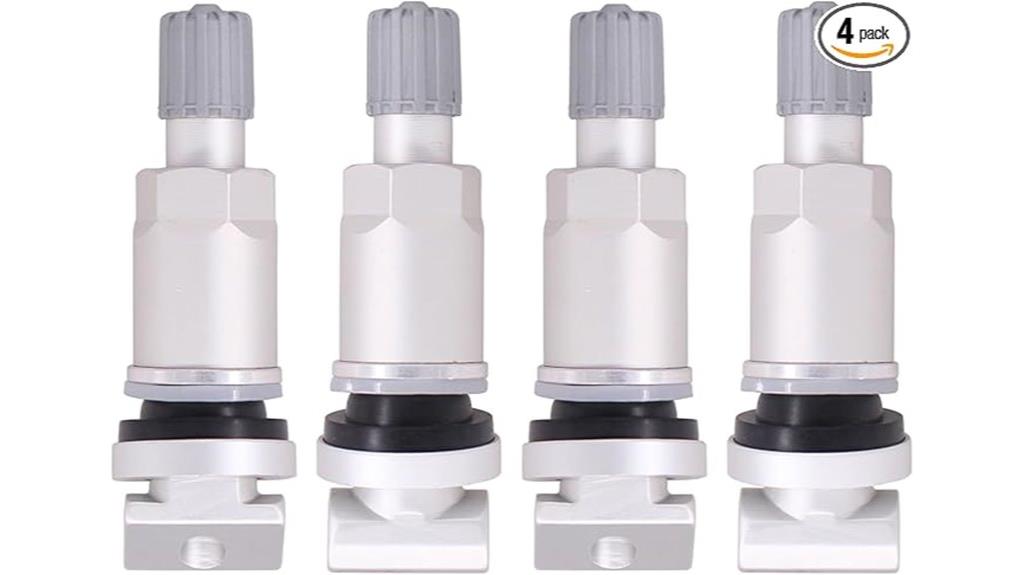
If you’re looking to quickly and affordably repair or replace TPMS sensors in a variety of popular vehicles, the ApplianPar Tire Pressure Sensor Valve Stem TPMS Repair Kit offers a practical solution. It includes four valve stems compatible with brands like Audi, BMW, Toyota, Honda, and more, making it versatile for many vehicles. The kit is lightweight, modern in style, and designed for easy tire mounting. While it has a solid reputation, customer ratings are mixed, averaging 3.4 stars. With a 30-day return policy through Amazon, it’s a convenient choice for those needing a cost-effective, straightforward TPMS repair option.
Best For: vehicle owners and repair professionals seeking an affordable, versatile solution for repairing or replacing TPMS sensors across multiple car brands.
Pros:
- Compatible with a wide range of popular vehicle brands including Audi, BMW, Toyota, Honda, and more.
- Easy to install with a modern design suited for tire mounting.
- Lightweight and compact, making it convenient to carry and store.
Cons:
- Customer ratings are mixed, averaging only 3.4 stars out of 5.
- Limited to 4 valve stems per kit, which may not be enough for multiple tire repairs at once.
- No detailed information on durability or long-term performance provided.
Autel MaxiTPMS TS508WF KIT Sensor Programming Tool
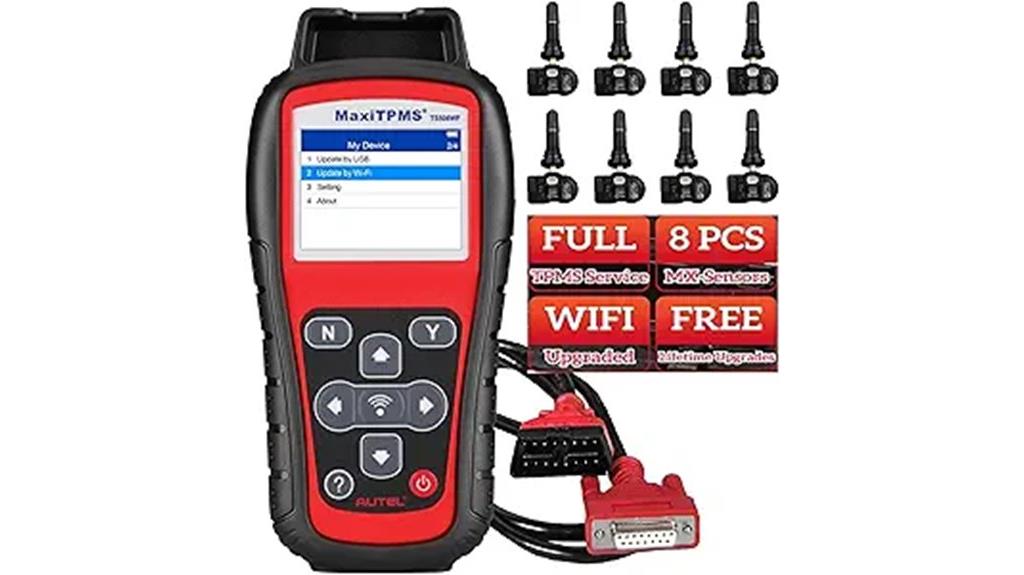
The Autel MaxiTPMS TS508WF KIT stands out as an ideal choice for professional workshops and serious DIY enthusiasts who need a versatile and reliable TPMS programming tool. It includes the TS508WF scanner and eight rubber MX-sensors, supporting both OE and aftermarket sensors at 433MHz and 315MHz. The kit offers extensive functions like sensor ID reading, pressure and temperature measurement, fault detection, and sensor activation. With quick and advanced diagnostic modes, it easily performs sensor programming, relearn procedures, and fault clearing. Its auto-create feature allows simultaneous programming of up to 16 sensors, making it perfect for quick, efficient TPMS system resets and diagnostics.
Best For: professional auto repair shops and serious DIY enthusiasts who require a comprehensive and reliable TPMS programming and diagnostic tool.
Pros:
- Supports both OE and aftermarket sensors at 315MHz and 433MHz frequencies for wide vehicle compatibility
- Features auto-create programming mode that can program up to 16 sensors simultaneously for efficiency
- Offers full TPMS diagnosis, including sensor ID reading, pressure, temperature, fault detection, and reset functions
Cons:
- Supports only Autel MX sensors, limiting compatibility with non-Autel sensors
- Relatively heavy at 3.24 pounds, which may affect portability for on-the-go use
- The advanced features and programming options may require some technical knowledge for optimal use
Factors to Consider When Choosing TPMS Retrofit Kits for Older Vehicles

Choosing the right TPMS retrofit kit depends on several key factors. I consider compatibility with my vehicle, ease of sensor installation, and how reliable the system is. Price, warranty, and power options also play a role in making the best choice for safety and value.
Compatibility With Vehicle Type
When selecting a TPMS retrofit kit for an older vehicle, ensuring compatibility with your specific make, model, and year is essential, especially since many older cars lack factory-installed sensors. Double-check that the kit supports your vehicle’s valve stem type, whether rubber or metal, for a proper fit. It’s also imperative to verify that the sensor frequency (such as 315 MHz or 433 MHz) matches your vehicle’s existing system to guarantee reliable communication. Additionally, confirm the kit includes the necessary programming or relearn procedures that are compatible with your vehicle’s TPMS system. Reviewing the manufacturer’s vehicle-specific fitment info and user instructions helps guarantee seamless integration, avoiding potential issues and ensuring your safety on the road.
Sensor Installation Ease
Selecting a TPMS retrofit kit that’s easy to install can save you time and frustration, especially if you’re working on an older vehicle without factory sensors. Look for kits with sensors that support simple clamp-in or snap-in installation, which reduces complexity. Kits that include clear, step-by-step instructions or programming tools make setup straightforward. Choosing sensors with universal compatibility and color-coded wiring or connectors can streamline the process further. Pre-programmed or auto-learning sensors are ideal because they require minimal configuration or vehicle-specific coding. Additionally, it’s helpful if the kit offers solid technical support or troubleshooting guidance to assist during installation and activation. Overall, an easy-to-install kit ensures a smoother, less stressful upgrade, so you get back on the road quickly and confidently.
System Accuracy and Reliability
System accuracy and reliability are critical factors to contemplate when upgrading your older vehicle with a TPMS retrofit kit, as these determine how trustworthy the sensor readings are over time. Precise kits should measure pressure within ±1.5 PSI and temperature within ±3°F to guarantee dependable data. The sensors and components must transmit data consistently without signal loss or delays, which is essential for safety and performance. Calibration and programming should be straightforward, providing stable, repeatable results across various vehicles. Durability is also fundamental—sensors need to resist water, dust, and temperature extremes to maintain accuracy. Ultimately, system reliability is validated through positive customer feedback, reviews, and adherence to industry standards, giving you confidence that the system will perform reliably over the long haul.
Power Source Options
Choosing the right power source for your TPMS retrofit kit is essential because it directly affects installation, maintenance, and long-term reliability. Battery-powered sensors are common, but they need battery replacements every 6 months to several years, depending on the model. Solar-powered kits harness ambient light to recharge, reducing the need for replacements, but they’re less effective in low-light conditions. Wireless power options eliminate wiring, making installation easier, but they might face limitations in range or consistent power delivery. When selecting a power source, consider your vehicle’s compatibility, how much maintenance you’re willing to handle, and your environment’s lighting conditions. Ensuring the power source is reliable will keep your sensors functioning accurately and consistently over time.
Price and Warranty Coverage
When evaluating TPMS retrofit kits for older vehicles, it’s important to contemplate both price and warranty coverage. I recommend comparing the cost of the kit with its warranty to gauge overall value and potential savings over time. Check if the warranty covers both parts and labor, especially since installation can be more complex on older vehicles. A longer warranty with all-encompassing coverage offers peace of mind against defects and installation issues. Be cautious of lower-priced kits, as they often have limited or shorter warranties, which could lead to higher costs if replacements are needed later. Look for products backed by manufacturer or seller warranties with straightforward claims processes and responsive customer support, ensuring you’re protected and supported throughout the kit’s lifespan.
Frequently Asked Questions
Can Retrofit TPMS Kits Be Installed Without Professional Help?
Yes, you can install retrofit TPMS kits yourself if you’re comfortable with basic car repairs. I recommend carefully reading the instructions and watching online tutorials beforehand. Make sure you have the right tools and follow each step precisely to avoid issues. However, if you’re unsure or uncomfortable, it’s better to get professional help to ensure everything works correctly and safely. Your vehicle’s safety depends on proper installation.
Do All TPMS Retrofit Kits Fit Every Vehicle Make and Model?
Not all TPMS retrofit kits fit every vehicle make and model. I’ve learned that compatibility depends on factors like the vehicle’s year, sensor type, and OEM system. Before buying, I always check the kit’s compatibility list or consult the manufacturer. It’s essential to verify the kit matches your vehicle’s specifications to avoid installation issues and ensure proper functionality for safety and performance.
How Do Retrofit Kits Impact Existing Tire Warranties?
Imagine driving with peace of mind, knowing your tire system is fully protected. Retrofit kits generally don’t void your tire warranty if installed correctly and by a professional, but it’s wise to double-check your warranty terms. I always recommend consulting your vehicle’s manual or dealer. Installing a quality kit can enhance safety without risking warranties, giving you confidence on every journey.
Are There Any Legal Regulations for Installing Aftermarket TPMS?
Yes, there are legal regulations for installing aftermarket TPMS. I always check local and federal laws before installing to confirm compliance. In the US, the National Highway Traffic Safety Administration (NHTSA) mandates TPMS on new vehicles, but aftermarket installations are typically legal as long as they’re properly installed and do not interfere with vehicle safety systems. It’s smart to verify with local authorities or a professional installer to avoid issues.
What Is the Typical Lifespan of a Retrofit TPMS Sensor?
Imagine your safety depends on it—I can tell you that retrofit TPMS sensors typically last between 5 to 7 years. The actual lifespan varies based on driving habits, climate, and sensor quality. Regularly checking your sensors helps catch issues early, ensuring you stay safe on the road. Think of it as a small investment that keeps your journey smooth and secure for years to come.
Conclusion
In wrapping up, choosing the right TPMS retrofit kit is all about balancing budget, compatibility, and convenience. Whether you’re upgrading for safety, sensing smarter, or simply saving some cash, these kits can truly transform your older ride. Don’t delay—delve into the details, decide on the dependable, and drive with confidence. Remember, a well-wired TPMS not only boosts safety but also brings peace of mind, making every trip smoother and safer.
